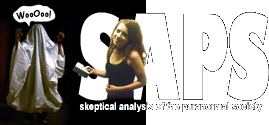Seeing the Future
Precognitive Predictions
Precognition is an ability to see the future through "extrasensory" perception. These may be visions or feelings, or come through in automatic writing (when you channel a spirit through pen and paper). People with "precognitive powers" may even be called prophets. One of these is Nostradamus.
Nostradamus lived from 1503-1566. In 1555, he published a book entitled "Les Propheties" which outlined (in quatrains) the future of the world. There has been much debate over the validity of Nostradamus' predictions, mostly because translations have been incorrect or altered to increase the validity of the claims, and because the events predicted cover a wide field of possibilities that can be associated after the fact. Here is one of Nostradamus' predictions:
The great Empire will soon be exchanged for a small place.
Which will soon begin to grow.
A small place of tiny area in the middle of which
He will come to lay down his scepter.
People who believe in Nostradamus' predictions say that this passage is about Napoleon. However, there are no obvious signs that it is. In fact, the description is so broad that it could apply to any leader of any country or empire. Since the word "middle" is used, we could even associate it with the Middle East. It is unlikely that Nostradamus was thinking of anything of the kind at the time. If he truly had the gift of foresight, wouldn't he have written his prophecies in a more obvious way? These bear more similarity to fortune cookies than the future.
The problem with "precognition" is that it is entirely unhelpful in predicting future events in a way that we can see. If I made the prediction that tomorrow Kool-Aid rain would fall from the sky, everyone would know not to wear white tomorrow. But in Nostradamus' time, the predictions were phrased more like poetry than information. It would be as though I said instead "In future times, the people will turn their faces to the sky as the rain bleeds, and children will smile". So later when it rains Kool-Aid, it sounds like I knew what I was talking about. I could've also been talking about a horrible bout of acid rain that children, unwittingly, had played in. It all depends on your perspective, and you won't have a particular perspective until after the fact - when you believe I've predicted something.
Predictions nowadays aren't quite as flowery, but many have to do with celebrities. Who will marry, who will divorce, who will put their career on hold when they have children. These predictions are not only incredibly inconsequential, but are also fairly easy to create if you happen to read gossip magazines. If you read about an actress who has had a lot of marriages in a short time frame that is marrying again, and you say "She will divorce in the next two years", it isn't precognition. It's a good guess.
It's no wonder that none of todays precognitives have managed to predict large-scale events like 9/11 or Hurricane Katrina. The self-proclaimed precognitives don't have access to the knowledge in advance, or have any hint of what's coming. However, some precognitives work off of widely published articles. Many have been predicting that Alzheimer's treatments, for example, will get much better soon. Is this because they have sensed it, or because progress is being made in stem cell research?
When you think about it, it would make much more sense for a precognitive to get a sense of a major event. If there are psychic energies flowing around the earth that they are attuned to, then the ones with the most energy should be the ones that affect the largest number of people. Anytime a "precognitive" predicts something about Britney Spears' marriage or Simon Cowell's love life, it's probably time to tune out.
Another good side of being precognitive is that you can claim you predicted something after it has happened, or change the wording of your prediction to fit what did happen. There's nothing stopping you from saying that you knew in advance. Except one man. Gene Emery, a writer for CSICOP Online, has been paying attention to predictions since 1979. Every year he writes an article about what was supposed to happen (according to precognitives) and what did happen (according to reality). So far there hasn't been a major hit. If precognition existed, wouldn't we have at least one accurate prediction by now?
On a final note, I will make predictions on things that will happen before the end of the year. I am not a psychic, and I promise you I have no special abilities whatsoever.
By the end of the year 2006:
- Paris Hilton will be engaged.
- George W. Bush will be publicly confronted by the leader of another nation for misrepresenting his intentions.
- Jennifer Aniston will get married.
For further reading:
- http://en.wikipedia.org/wiki/Nostradamus
- http://www.armageddononline.org/nostradamus.php
- http://www.csicop.org/specialarticles/predictions-2005.html
- http://www.psychictwins.com/2005article4.html
- http://www.themystica.com/mystica/articles/p/precognition.html
Back to the reports.
